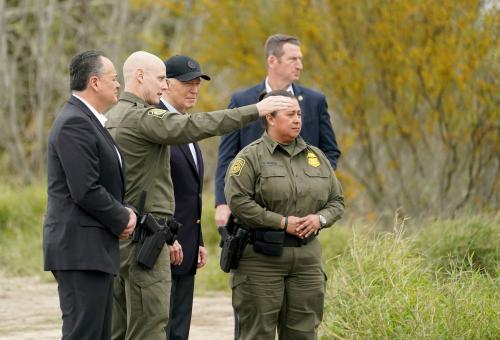The following is a summary of the 11th session of the Congressional Study Group on Foreign Relations and National Security, a program for congressional staff focused on critically engaging the legal and policy factors that define the role that Congress plays in various aspects of U.S. foreign relations and national security policy.
On Feb. 5, 2021, the Congressional Study Group on Foreign Relations and National Security met to discuss the export and proliferation of civilian nuclear technology. Over the course of the Biden administration’s first term, the United States will have to decide not only whether to re-enter a nuclear agreement with Iran, but also whether to renew or amend U.S. civilian nuclear cooperation agreements with Egypt (2021), Morocco (2021), South Korea (2021) and Turkey (2023), enter into an agreement with Saudi Arabia, and resume or expand nuclear cooperation with Russia and China. But what input does Congress have into these decisions? And how could it choose to structure legal authorities differently if it wanted to expand that role?
To discuss these issues, the study group was joined by two outside experts: Henry Sokolski, the Executive Director of the Nonproliferation Education Center; and Eldon Greenberg, a former Deputy General Counsel for the U.S. Agency for International Development (“USAID”) among other senior government roles.
Prior to the session, the participants circulated several recommended pieces of background reading, including:
- Shayan Kirbassi, “Civil Nuclear Cooperation Through 123 Agreements: A Primer,” Lawfare (Oct. 15, 2020);
- Victor Gilinsky and Henry Sokolski, “The Nonproliferation Gold Standard: The New Normal?,” Arms Control Today (October 2019);
- Gregory S. Jones, “Can Bulk Nuclear Fuel Facilities Be Effectively Safeguarded?,” Nonproliferation Policy Education Center (Aug. 5, 2020); and
- Eldon V.C. Greenberg, “U.S. Law, Advance Consents for Reprocessing and the ‘Timely Warning’ Standard,” Nonproliferation Policy Education Center (May 2019).
Greenberg and Sokolski began the session with some opening remarks focusing on the Nuclear Non-Proliferation Act (“NNPA”). Below is a recording:
You can also access a copy of Sokolski’s powerpoint slides here.
Greenberg began with an overview of the history of the NNPA, noting that it is marked by the systematic undercutting of Congress’ basic intent by the executive branch. By 1996—and continuing today—the United States was exercising little control over back-end fuel cycle activities with its major trading partners. This is not what Congress intended.
Greenberg then discussed the questionable lawfulness of advanced long-term consent agreements for reprocessing and the meaning of timely warning criteria in the Act. As for advanced long-term consent, the goal of the statute was to impose clear controls on back-end fuel cycle activities; that is inconsistent with allowing our trade partners to do whatever they please once they retain control of the facilities. Consent cannot mean abdication of future consent rights. In regard to timely warning, Professor Greenberg noted that, under any interpretation of section 131(b), it is difficult to reconcile the need to make determinations about increases in proliferation-risk and timely warning of diversions with an effort to “crystal-ball” the risks of an agreement.
Greenberg then provided an overview of how Congress’s intent—and the basic principles underlying the NNPA—unraveled, from President Carter to W. Bush. He then fast-forwarded to the present, noting that in 2021, the issue of advanced long-term consent and the applicability of timely warning is more an academic, historical topic than a real, political problem. Principles of Chevron deference coupled with congressional acquiescence make any legal challenge a losing proposition. Still, the argument against 30-year advanced consent has the intellectual high ground. And nothing is stopping President Biden from exercising control over back-end fuel cycle activities.
Sokolski spoke next. He argued that Congress has much more power regarding the export and proliferation of civilian nuclear technology than it thinks. Indeed, Congress can condition the executive branch’s authority to seal nuclear cooperative agreements with foreign entities, and it can condition the executive’s authority to strike nuclear cooperative agreements (and has done so previously). Additionally, Congress can treat nuclear cooperative agreements as it currently does trade agreements—that is, by requiring majority approval in each House of Congress.
As it currently stands, however, Congress takes a hands-off approach to nuclear cooperative agreements. The presumption, adopted in the Atomic Energy Act of 1946, was that Congress could control whether nuclear materials and information were shared with other countries. This changed with President Eisenhower and the Atomic Energy Act of 1954, wherein Congress delegated most of its nuclear trade-making authority to the President. But there is no reason why Congress cannot regain control today. To be sure, Congress has asserted some control in the past and has forced the President’s hand on several occasions, forcing him to amend and/or suspend the U.S.-Russia, U.S.-UAE, U.S.-Vietnam, and the U.S.-China agreements. These examples make clear that congressional control is possible here—and it is preferable.
The study group then moved to open discussion where participants raised a number of related issues, including the role of environmental safeguards, the role of congressional oversight versus legislative control, and procedural reasons why Congress may or may not wish to be involved in closer scrutiny of relevant agreements.
Visit the Congressional Study Group on Foreign Relations and National Security landing page to access notes and information on other sessions.



